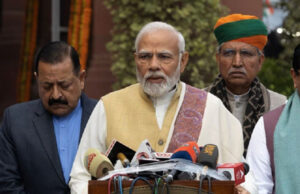 Qazi Mizan: At around 11am on Feb 14, some 20 Indian tax officials and police burst into the BBC’s offices in New Delhi, shouting at staff to step away from their computers and hand over their mobile phones, according to two people present.The tax inspections at the BBC’s offices – during which officials cloned the mobile phones of some senior staff and searched computers, according to the two people present – have highlighted the concerns of some journalists and media rights watchdogs about what they say is a decline in press freedom under Modi.
Qazi Mizan: At around 11am on Feb 14, some 20 Indian tax officials and police burst into the BBC’s offices in New Delhi, shouting at staff to step away from their computers and hand over their mobile phones, according to two people present.The tax inspections at the BBC’s offices – during which officials cloned the mobile phones of some senior staff and searched computers, according to the two people present – have highlighted the concerns of some journalists and media rights watchdogs about what they say is a decline in press freedom under Modi.
Reuters spoke to eight Indian journalists, industry executives and media analysts who said that some media which reported critically on the government have been targeted with inspections by government agencies, the suspension of state advertising, and the arrest of reporters. “There’s never been a golden age of Indian journalism,” said Abhinandan Sekhri, chief executive of independent online media group, Newslaundry, whose offices in New Delhi were surveyed twice by tax officials in 2021 after critical coverage of Modi’s administration. “But it has never been like it is now.”
Since Modi took office in 2014, India has slid from 140th in World Press Freedom Index, an annual ranking by non-profit Reporters Without Borders, to 150th place last year, its lowest ever.sModi’s government rejects the Index’s findings, questioning its methodology, and says India has a vibrant free press.The world’s most populous democracy with 1.4 billion people, India has thousands of newspapers and hundreds of TV news channels.
The Editors Guild of India, an industry association, said the BBC raids were part of a trend of “government agencies being used to intimidate and harass news organisations.” It cited four similar tax inspections against media in 2021.
In one of those, the offices of Dainik Bhaskar, one of India’s largest newspapers by circulation, were raided in July 2021 by tax authorities, who alleged it evaded taxes on income worth 7 billion Indian rupees ($84.47 million). The paper has contested the charge and the case is ongoing.
The newspaper – part of DB Corp (DBCL.NS), one of India’s largest newspaper groups – had published a series of articles alleging authorities mishandled the Covid-19 pandemic and underreported deaths. The government has denied mistakes in its response and undercounting.
A senior Dainik Bhaskar executive, who asked not to be identified because of the sensitivity of the issue, said the raids followed an unexplained halt in advertising by the federal government and six BJP-controlled states from February 2021. The suspension lasted until August 2022 and cost the newspaper more than 1 billion rupees ($12.25 million), he said
In a report last year, Reporters Without Borders said that, despite high readership, many Indian news organisations were vulnerable to economic pressure because of their reliance on government advertising.The acquisition of some media groups by billionaires seen as close to Modi has also led to the silencing of independent voices in the Indian press, it said.
Reports from international press freedom watchdogs, including the Committee to Protect Journalists (CPJ), say that – in addition to the financial pressures on media organisations – the federal and state governments in India have detained an increasing number of journalists for their reporting.At least seven journalists remained behind bars in India as of December, the highest number in 30 years, according to the CPJ’s annual global tracker released on Dec 14.
In some instances, reporters have been detained by state governments – which control local police forces – after reporting on minor issues.





